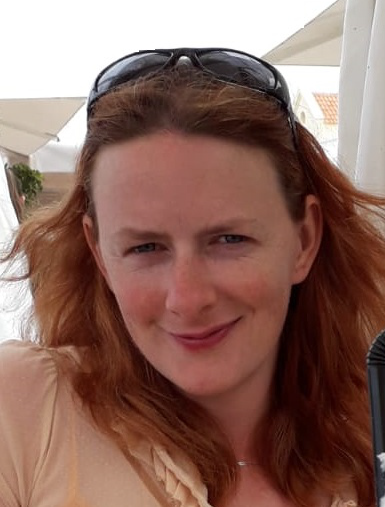Laura Alcock
ECG Bulletin July 2020
Laura Alcock is a committee member of the Environmental Chemistry Group. Her career, so far, has taken her through microbiology, metal ore analysis, material recovery, and quality compliance to her current role as a development chemist/engineering support chemist at a manufacturer of exhaust gas management systems for the electronics industry.
|
What inspired you to become a scientist?
When I was around 5, my Mum gave me a book for my birthday – Science with Dinosaurs. It had descriptions and instructions for experiments to do at home using household items, all demonstrating various scientific concepts. Since then, I have been hooked on practical science. Every time I learnt something new about the way the world works, I became more entrenched in my passion for science. How did you come to specialise in abatement combustion chemistry? Whilst applying for University, I met the Head of Admissions to the School of Biochemical Sciences at Liverpool John Moores University, who advised me that their forensic science degree would suit my desire to study analytical science, including analytical chemistry, microbiology and physics. From there, my career led me through analytical microbiology, chemical analysis of metal ore concentrates, precious metal recovery and quality compliance, to my current role. |
Could you describe your current job?
My day-to-day activities vary greatly. My role includes the development of the combustion chemistry inputs to achieve efficient and clean abatement of semiconductor process gases which would otherwise present a great risk to human life and/or the environment. I also investigate customer queries and problems, including root-cause analysis for product incidents. This can then lead to liaising with the Company’s engineering teams to develop a solution to solve the issues or prevent further incidents.
What advice would you give to anyone considering a career in environmental chemistry?
Knowing what you like about chemistry is vital to ensuring you follow a career you enjoy. It is also important to remember that careers in academia or industry can provide opportunities for research and development.
What are some of the challenges facing the environmental chemistry community?
Half-considered conclusions and sweeping generalisations. With all aspects of our lives being examined and, in many cases, challenged, it is important that we combat premature solutions by considering all of their impacts (e.g. wind farms as a major electricity source can require nearly as much energy to maintain as they generate).
What is the most rewarding aspect of your career so far?
Being able to contribute to protecting our environment from manufacturing practices has been a seriously rewarding aspect of my career so far. Knowing that I have reduced the pollution released during the manufacture of everyday devices, as well as being able to raise awareness in the general public of the energy and potentially harmful materials involved in manufacturing these devices, provides me with a great sense of achievement.
If you weren’t a scientist what would you do?
If I weren’t a scientist, I would probably be a wedding and events planner. I coordinated a number of events for charity fundraising when I was at school and sixth form and really enjoyed it. Planning my own wedding illustrated to me how much I enjoyed the task and I gave it real consideration, but I enjoy science too much.
And what do you do when you are not working?
I have a vast series of hobbies, including sports – football, trail-cycling, squash, surfing, etc.; crafts – knitting, woodwork, embroidery; reading and writing. In fact, between my work, my hobbies and my activities with the RSC’s Environmental Chemistry Group, I need to be careful that I get enough sleep!
My day-to-day activities vary greatly. My role includes the development of the combustion chemistry inputs to achieve efficient and clean abatement of semiconductor process gases which would otherwise present a great risk to human life and/or the environment. I also investigate customer queries and problems, including root-cause analysis for product incidents. This can then lead to liaising with the Company’s engineering teams to develop a solution to solve the issues or prevent further incidents.
What advice would you give to anyone considering a career in environmental chemistry?
Knowing what you like about chemistry is vital to ensuring you follow a career you enjoy. It is also important to remember that careers in academia or industry can provide opportunities for research and development.
What are some of the challenges facing the environmental chemistry community?
Half-considered conclusions and sweeping generalisations. With all aspects of our lives being examined and, in many cases, challenged, it is important that we combat premature solutions by considering all of their impacts (e.g. wind farms as a major electricity source can require nearly as much energy to maintain as they generate).
What is the most rewarding aspect of your career so far?
Being able to contribute to protecting our environment from manufacturing practices has been a seriously rewarding aspect of my career so far. Knowing that I have reduced the pollution released during the manufacture of everyday devices, as well as being able to raise awareness in the general public of the energy and potentially harmful materials involved in manufacturing these devices, provides me with a great sense of achievement.
If you weren’t a scientist what would you do?
If I weren’t a scientist, I would probably be a wedding and events planner. I coordinated a number of events for charity fundraising when I was at school and sixth form and really enjoyed it. Planning my own wedding illustrated to me how much I enjoyed the task and I gave it real consideration, but I enjoy science too much.
And what do you do when you are not working?
I have a vast series of hobbies, including sports – football, trail-cycling, squash, surfing, etc.; crafts – knitting, woodwork, embroidery; reading and writing. In fact, between my work, my hobbies and my activities with the RSC’s Environmental Chemistry Group, I need to be careful that I get enough sleep!


